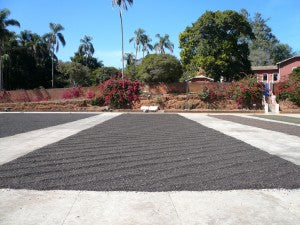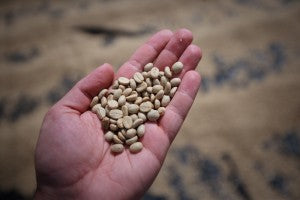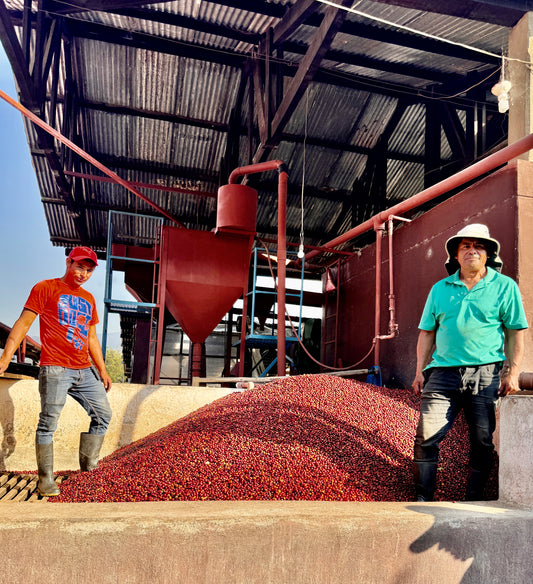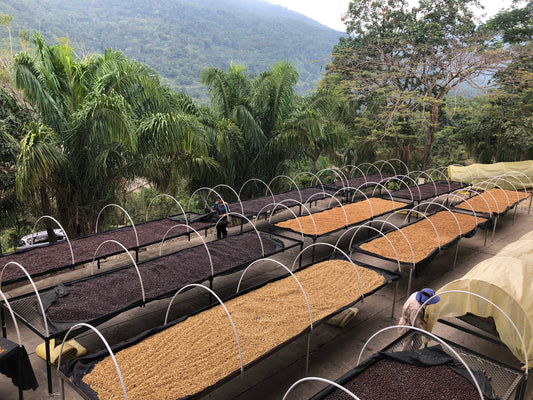Coffee Processing: What gives coffee unique flavors?

This is an interesting question, and one that does not have a quick answer. I often compare coffee to wine as there are many comparables. All bottles of red wine from Italy do not taste the same. It is dependent on the vineyard, the grape (Merlot, etc..), the harvest, soil conditions, altitude, weather conditions of that particular harvest in that particular year, in that particular region. All of this is also true with coffee.
Nicaragua, for example typically has farms with lots of gain in elevation. You can have a single farm which grows coffee from 800 meters all the way up to 1800 meters!
Elevation plays a significant part in the quality of coffee. Soil conditions & make up, the varietal of coffee cherry (Bourbon, Typica, Caturra, etc…), weather conditions, region with in the country (or the country itself) are some variables that make up the flavors found in a coffee. As important, is the way the coffee cherries are harvested. Selectively picking only the ripest red cherries develops a sweeter and more balanced acidity in the cup.
However, what I wanted to talk about was what happens AFTER the coffee cherries are picked. Once a coffee cherry has been picked, it must be processed, dried, rested and then exported. EVERY step along the life cycle of coffee affects the end result in your cup of coffee. Today, I wanted to explain a little bit about processing of coffee cherries at the Wet Mill.
Each country seems to have their specialty when processing coffee and each process requires something a little different, which results in different cup profiles. Typically the best mills/farms have the ability to customize the processing methods to meet our flavor standards, but they are few and far between. It’s our job to find them and discover a unique process which brings out the best profiles for our clients. A few of the most popular processing techniques are:
Natural, or Dry Processed
This is one of the hardest processing techniques to do properly and is the original way coffee was processed in Ethiopia. Ethiopian coffee is still traditionally done this way as are many African varietals. Brazil and Indonesia also practice this technique. Naturals do not require water; therefore it is the chosen method in “dryer” countries.

Naturally processed coffee requires the Mill to leave all the fruit of the cherry on the coffee bean while drying in the sun. The challenge with this process is not fermenting your coffee. This can cause mold, fungus and very unpleasant flavor in the cup.
Naturals typically give a heavier bodied coffee. Flavors of fruit (red berries, tropical fruit, etc..) or “earthy” characteristics are often noted.
Fully Washed
This is the most sought after processing method as it achieves the cleanest and most balanced cup profile and the “average” coffee drinkers prefers these coffees. Central America is the largest producer of fully washed coffees as it requires a LOT of water through out the entire process. Central American countries have access to natural water springs almost every where, so this isn’t an issue. The larger issue comes into how the mills recycle and re-use this water in order to protect the environment.

Fully Washed coffees require you to remove the cherry pulp using a de-puling machine. The coffee bean is then moved into a fermentation tank where coffee will be submerged in water for approximately 36 hours. This fermenting process will loosen up the mucilage left on the bean after the cherry pulp is removed. Once ready, the mucilage on the bean will be removed from the green bean, re-washed in fresh water for another 24 hours and then dried.
This process requires a lot of specialized equipment but enables someone to process a large amount of coffee at one time (if desired). This process also removes the heavier flavors found in Naturals, and produces cleaner cup profiles. Typically fully washed coffees have nice balanced/bright acidities, but sometimes lack a full body.
Honey Prep, or Pulped Naturals
Honey Prep is a relatively new process being practiced at higher end coffee farms/mills. It is challenging to do, require extra time & work and has the same risk as Naturals because coffee can ferment. The drying process takes extra time as the beans stick together and do not easily rake. This is currently being perfected in Costa Rica; however this process has been exported from Brazil for many years, and currently being experimented with more often in Nicaragua and Colombia.
This process requires you to de-pulp your coffee cherry and then immediately go to the drying patios. It is vital that this process happens quickly as the fermenting process happens very soon as the mucilage is filled with sugar. This is called Honey Prep as the tackiness of the mucilage left on the beans is similar to that of honey. The left over water from Fully Washed coffee is also called “Honey Water” due to the aroma it gives off.
Colombian wet mills use Mechanical Mucilage removers that require 1/40th the amount of water when comparing Fully Washed coffee. This same equipment is now used all over Costa Rica. These mechanical removers allow you to control the amount of sugar left on the bean. Some mills in Costa Rica now produce “Red Honey” coffee which leaves all the sugars from the mucilage on the beans.
I’m a huge fan of Honey Prep coffees because the profiles are similar to a Fully Washed coffee with the ability to be sweeter and have a fuller body.
Wet Hulled / Wet Milled
This is the newest process being talked about in coffee. This is being practiced almost exclusively in Indonesia (Sumatra, Sulawesi, Flores, etc..). Indonesian coffees have been a bit of a mystery to many coffee professionals as it has been one of the least explored regions to date. This is quickly changing.
Wet Hulled coffee is the removal of the coffee cherry as well as the mucilage directly after picking. This does not use a fermenting process for this removal, but instead uses a modified husking station. Husking stations are typically only used to remove the dried parchment from coffee beans after they are totally dry (Parchment is under the mucilage…like the skin of a peanut).
Indonesian coffees have an extremely unique cup characteristic and are typically described with flavors of: Earth, wood, dirty, heavy bodied, tobacco, leather and typically roasted darker to offset some of the more un-desirable flavors. Some professionals believe these flavors are due to the fact that the protective layers have all been removed from the coffee bean exposing it to environment during the drying process.
As more coffee roasters work directly with growers and mills in Indonesia, their drying processes are becoming more advanced/accurate, producing a cleaner cup profile. What’s great is that these coffees still taste “Indonesian” but instead of un-desirable flavors we are picking up: Brown sugar, molasses, chocolate, tropical fruit, licorice, sweet and floral characteristics. I do not think it will be long before more regions explore Wet Hulled processed coffees.
Obviously from here the variables continue to add up on what changes the flavor of coffee. Things like the proper amount of time coffee must rest before exporting, density checking, screening of dried coffee, proper bagging and prompt shipping all before reaching the coffee roasters around the globe. Coffee is one of the most delicate products in the world which requires absolute care and attention to detail from start to finish. It’s our duty to respect the efforts, hard work and attention of the work done before us, so that those whose who use our products get to enjoy the fruits of every ones effort.















